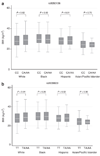FTO polymorphisms are associated with obesity but not diabetes risk in postmenopausal women
- PMID: 18787525
- PMCID: PMC2732012
- DOI: 10.1038/oby.2008.408
FTO polymorphisms are associated with obesity but not diabetes risk in postmenopausal women
Abstract
The FTO gene was recently identified as a susceptibility locus for both obesity and type 2 diabetes by whole-genome association analyses of several European populations. We tested for an association between FTO risk alleles and obesity and diabetes in a well-characterized multiethnic cohort of postmenopausal women in the United States. We genotyped two most significantly associated single-nucleotide polymorphisms (SNPs) (rs9939609 and rs8050136) in intron 1 of FTO gene in a nested case-control study of 1,517 diabetes cases and 2,123 controls from the Women's Health Initiative-Observational Study (WHI-OS). The allelic frequencies of either rs9939609 or rs8050136 differed widely across four ethnic groups. The frequency of the rare allele A of rs9939609 among controls was much lower in Asians/Pacific Islanders (17%) than in blacks (45%), whites (40%), and Hispanics (31%). We found significant associations of rs9939609 with BMI and waist circumference in white and Hispanic women, but not among black and Asian/Pacific Islander women. On average, each copy of the risk-allele A at rs9939609 was significantly associated with 0.45 kg/m(2) increase in BMI (95% confidence interval (CI): 0.16-0.74; P = 0.004) and 0.97 cm increase in waist circumference (95% CI: 0.21-0.65; P = 0.0002). Similar results were observed for rs8050136. However, we found no significant genetic associations with diabetes risk, either within the full study sample or in any ethnic group. In conclusion, common genetic variants in the intron 1 of FTO gene may confer a modest susceptibility to obesity in an ethnicity-specific manner, but may be unlikely to contribute to a clinically significant diabetes risk.
Conflict of interest statement
The authors declare no conflict of interest.
Figures

Similar articles
-
The bigger picture of FTO: the first GWAS-identified obesity gene.Nat Rev Endocrinol. 2014 Jan;10(1):51-61. doi: 10.1038/nrendo.2013.227. Epub 2013 Nov 19. Nat Rev Endocrinol. 2014. PMID: 24247219 Free PMC article. Review.
-
Risk of type 2 diabetes and obesity is differentially associated with variation in FTO in whites and African-Americans in the ARIC study.PLoS One. 2010 May 20;5(5):e10521. doi: 10.1371/journal.pone.0010521. PLoS One. 2010. PMID: 20502638 Free PMC article.
-
Meta-analysis added power to identify variants in FTO associated with type 2 diabetes and obesity in the Asian population.Obesity (Silver Spring). 2010 Aug;18(8):1619-24. doi: 10.1038/oby.2009.469. Epub 2010 Jan 7. Obesity (Silver Spring). 2010. PMID: 20057365
-
Analysis of FTO gene variants with obesity and glucose homeostasis measures in the multiethnic Insulin Resistance Atherosclerosis Study cohort.Int J Obes (Lond). 2011 Sep;35(9):1173-82. doi: 10.1038/ijo.2010.244. Epub 2010 Nov 23. Int J Obes (Lond). 2011. PMID: 21102551 Free PMC article.
-
Implications of critical PPARγ2, ADIPOQ and FTO gene polymorphisms in type 2 diabetes and obesity-mediated susceptibility to type 2 diabetes in an Indian population.Mol Genet Genomics. 2016 Feb;291(1):193-204. doi: 10.1007/s00438-015-1097-4. Epub 2015 Aug 5. Mol Genet Genomics. 2016. PMID: 26243686
Cited by
-
Association analysis of FTO gene polymorphisms and obesity risk among Egyptian children and adolescents.Genes Dis. 2017 Jul 4;4(3):170-175. doi: 10.1016/j.gendis.2017.06.002. eCollection 2017 Sep. Genes Dis. 2017. PMID: 30258920 Free PMC article.
-
Evaluation of genetic susceptibility loci for obesity in Chinese women.Am J Epidemiol. 2010 Aug 1;172(3):244-54. doi: 10.1093/aje/kwq129. Epub 2010 Jul 8. Am J Epidemiol. 2010. PMID: 20616199 Free PMC article.
-
Replication of 6 obesity genes in a meta-analysis of genome-wide association studies from diverse ancestries.PLoS One. 2014 May 30;9(5):e96149. doi: 10.1371/journal.pone.0096149. eCollection 2014. PLoS One. 2014. PMID: 24879436 Free PMC article.
-
The bigger picture of FTO: the first GWAS-identified obesity gene.Nat Rev Endocrinol. 2014 Jan;10(1):51-61. doi: 10.1038/nrendo.2013.227. Epub 2013 Nov 19. Nat Rev Endocrinol. 2014. PMID: 24247219 Free PMC article. Review.
-
Association of a common rs9939609 variant in the fat mass and obesity-associated (FTO) gene with obesity and metabolic phenotypes in a Taiwanese population: a replication study.J Genet. 2016 Sep;95(3):595-601. doi: 10.1007/s12041-016-0671-9. J Genet. 2016. PMID: 27659330
References
Publication types
MeSH terms
Substances
Grants and funding
- N01WH2210/WH/WHI NIH HHS/United States
- K01-DK078846/DK/NIDDK NIH HHS/United States
- 32100-2/PHS HHS/United States
- 24152/PHS HHS/United States
- 42129-32/PHS HHS/United States
- 32118-32119/PHS HHS/United States
- R56 DK062290/DK/NIDDK NIH HHS/United States
- 44221/PHS HHS/United States
- 32111-13/PHS HHS/United States
- R01 DK062290/DK/NIDDK NIH HHS/United States
- 32105-6/PHS HHS/United States
- 42107-26/PHS HHS/United States
- 32115/PHS HHS/United States
- DK062290/DK/NIDDK NIH HHS/United States
- 32108-9/PHS HHS/United States
- K01 DK078846/DK/NIDDK NIH HHS/United States
- 32122/PHS HHS/United States
LinkOut - more resources
Full Text Sources
Medical

